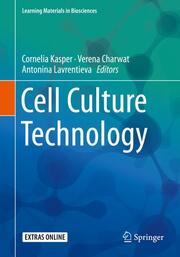Detailansicht
Cell Culture Technology
Learning Materials in Biosciences
ISBN/EAN: 9783319748535
Umbreit-Nr.: 3309360
Sprache:
Englisch
Umfang: xii, 168 S., 4 s/w Illustr., 60 farbige Illustr.,
Format in cm:
Einband:
kartoniertes Buch
Erschienen am 23.10.2018
Auflage: 1/2018
- Zusatztext
- This textbook provides an overview on current cell culture techniques, conditions and applications, it specifically focuses on human cell culture. The book is based on lectures, seminars and practical courses in stem cells, tissue engineering, regenerative medicine and 3D cell culture held at the University Natural Resources and Life Sciences Vienna BOKU and the Gottfried Wilhelm Leibniz University Hannover with contributions from international scientists. The textbook delivers in a compact and clear way important theoretical as well as practical knowledge to advanced graduate students on cell culture techniques and the current status of research. The book is written for Master Students and PhD Candidates in biotechnology, tissue engineering and biomedicine working with mammalian,and specifically human cells. It will be of interest to doctoral colleges, Master- and PhD programs teaching courses in this area of research.
- Kurztext
- Springer Learning Materials
- Autorenportrait
- Cornelia Kasper studied Chemistry at the University Hannover and received her Diploma degree 1994. After PhD at the Institute for Technical Chemistry 1998 she was employed as EU liason officer at the University of Hannover. In 2007 she received Habilitation. 2000-2011 Cornelia Kasper has been head of Cell Culture and Tissue Engineering Group at the Institute for Technical Chemistry, Leibniz University of Hannover and head of young researcher group JRG "Large Scale Cultivation" within Cluster of Excellence "Rebirth" (from Regenerative Biology and Reconstructive Therapies). Since October 2011 Cornelia Kasper has been appointed as University Professor "Cell and Tissue Culture Technology" at the Department of Biotechnology at Boku. The focus in her research group is the isolation, characterization, expansion and differentiation of human primary/progenitor and stem cells. For the expansion and guided differentiation she develops optimized strategies and bioprocesses for 3 D cell culture conditions mimicking physiological environment generating functional cells for tissue engineering and cell based therapies and 3 D test systems under defined and controlled dynamic conditions. Antonina Lavrentieva is a group leader at the Institute of Technical Chemistry, Leibniz University of Hannover, working in the field of stem cell research, biotesting and tissue engineering. In her second PhD Thesis, she studied methods of expanding mesenchymal stem cells (MSCs) in bioreactors, as well as the influence of hypoxia on the MSCs. She studied Biology and Life Science at Moscow State University and the University of Hannover. She also defended a PhD Thesis in Physiology. Her current research interests include stem cell media optimization, 3D cell culture, gradient hydrogels for studying cell niches and 3D-bioprinting. Verena Charwat completed her bachelor studies in Medical Computer Science at the Vienna University of Technology in 2008 and her diploma studies in Bioengineering with specialization on biotechnological quality management at FH-Campus Wien in 2009. She continued her academic training with the Biomedical Ph.D. program at Medical University Vienna. Her Ph.D. thesis is entitled "Biosensors for label-free continuous monitoring of microfluidic cell cultures". Since her graduation in 2014, she is working as a postdoctoral university assistant at the University of Natural Resources and Life Sciences, Vienna. Verena Charwat's main research interest is in the field of biomedical engineering, with a special focus on the development and application of lab-on-a-chip systems with integrated biosensors for in vitro establishment and non-invasive monitoring of functional tissue mimics. Her research is targeted towards creation of physiologically relevant cell culture models including 3D cultivation, co-cultures and dynamic cultivation for basic biological research and biomedical applications.
